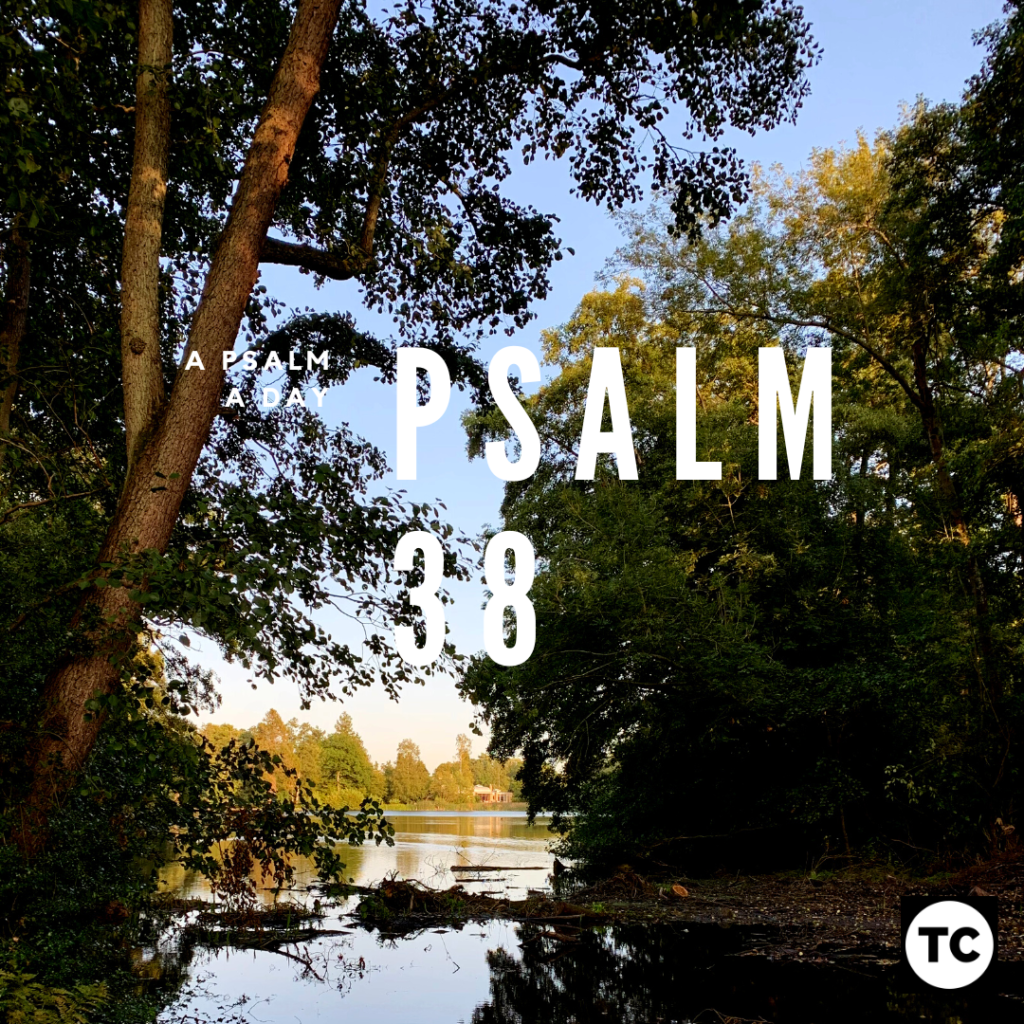Throughout September 2022, I managed to read and reflect – briefly – on a Psalm each day. For December 2022, I’m going to pick up the discipline. I’ll read the Psalm, pray, and then ponder a few questions:
- What is this Psalm about?
- What does this Psalm teach about God?
- How does this Psalm connect to God’s people today?
I’ll close the post with a simple prayer, trying to draw the themes together.

On the ninth of December, here’s Psalm 38:
1 Lord, do not rebuke me in your anger
or discipline me in your wrath.
2 Your arrows have pierced me,
and your hand has come down on me.
3 Because of your wrath there is no health in my body;
there is no soundness in my bones because of my sin.
4 My guilt has overwhelmed me
like a burden too heavy to bear.
5 My wounds fester and are loathsome
because of my sinful folly.
6 I am bowed down and brought very low;
all day long I go about mourning.
7 My back is filled with searing pain;
there is no health in my body.
8 I am feeble and utterly crushed;
I groan in anguish of heart.
9 All my longings lie open before you, Lord;
my sighing is not hidden from you.
10 My heart pounds, my strength fails me;
even the light has gone from my eyes.
11 My friends and companions avoid me because of my wounds;
my neighbors stay far away.
12 Those who want to kill me set their traps,
those who would harm me talk of my ruin;
all day long they scheme and lie.
13 I am like the deaf, who cannot hear,
like the mute, who cannot speak;
14 I have become like one who does not hear,
whose mouth can offer no reply.
15 Lord, I wait for you;
you will answer, Lord my God.
16 For I said, “Do not let them gloat
or exalt themselves over me when my feet slip.”
17 For I am about to fall,
and my pain is ever with me.
18 I confess my iniquity;
I am troubled by my sin.
19 Many have become my enemies without cause;
those who hate me without reason are numerous.
20 Those who repay my good with evil
lodge accusations against me,
though I seek only to do what is good.
21 Lord, do not forsake me;
do not be far from me, my God.
22 Come quickly to help me,
my Lord and my Saviour.
What is this Psalm about?
This Psalm is a petition from David to God for help. Most of it (pretty much the first 20 verses of a 22 verse Psalm!) is a litany of things that David is wrestling with, that are assailing him. There are internal ‘feelings’, like guilt (v4), internal pains, as in verse 7, obvious physical issues like wounds (v5), and external circumstances that threaten (v12, 19, 20, non-exhaustively). This is a Psalm which powerfully speaks to all forms of human pain – including relational pain. I actually listened to this Psalm today whilst in bed with a migraine, in quite a lot of pain, feeling ‘feeble and utterly crushed’, and feeling very appreciative that this Psalm is in the Bible. This Psalm shows us that God cares for us regardless of what assails us – and, with the glimmers of hope in this Psalm, can do something about it.
What does this Psalm teach us about God?
The God of Psalm 38 might seem absent – but even in God’s absence we can see His hands. David might have been near death – but he didn’t die. Psalm 38 shows us a God who literally frames our experiences – note that ‘The Lord’ is pretty much the first and last thought here. Verse 2 is also a challenge – David clearly believes and the Bible clearly teaches that some (all?) forms of suffering are in some way the result of God’s action (or arrows) and wrath. God, then, is a powerful God. God is also a relational, intimate God – David calls out to God, and the Psalm ends on a note of trust. Sometimes truth is complex and uncomfortable – but God is God and so we wrestle.
How does this Psalm connect to God’s people today?
Simply put, whatever you are going through, or I am experiencing, it has a referent here. Whatever you believe about it and God’s actions, there is the invitation to cry out to God. As someone who has a high view of God’s sovereignty, I think only the God who hurls the arrows has the strength to heal their wounds – and so it is in that knowledge that I can cry out to Him. Psalm 38 is an uncomfortable Psalm – not least in it’s description of David’s various pain, but also in it’s hints about God – but it is a vital Psalm in a world where pain exists, and yet a world where one day it won’t, because of the action of God.
A prayer drawn from Psalm 38:
Today, I draw the prayer from some of the words of the Psalm, and suggest you augment it with whatever you need to bring before the Lord.
Lord, do not rebuke me in your anger or discipline me in your wrath. I wait for you; you will answer, Lord my God. Lord, do not forsake me; do not be far from me, my God. Come quickly to help me, my Lord and my Saviour.
Leave a Reply